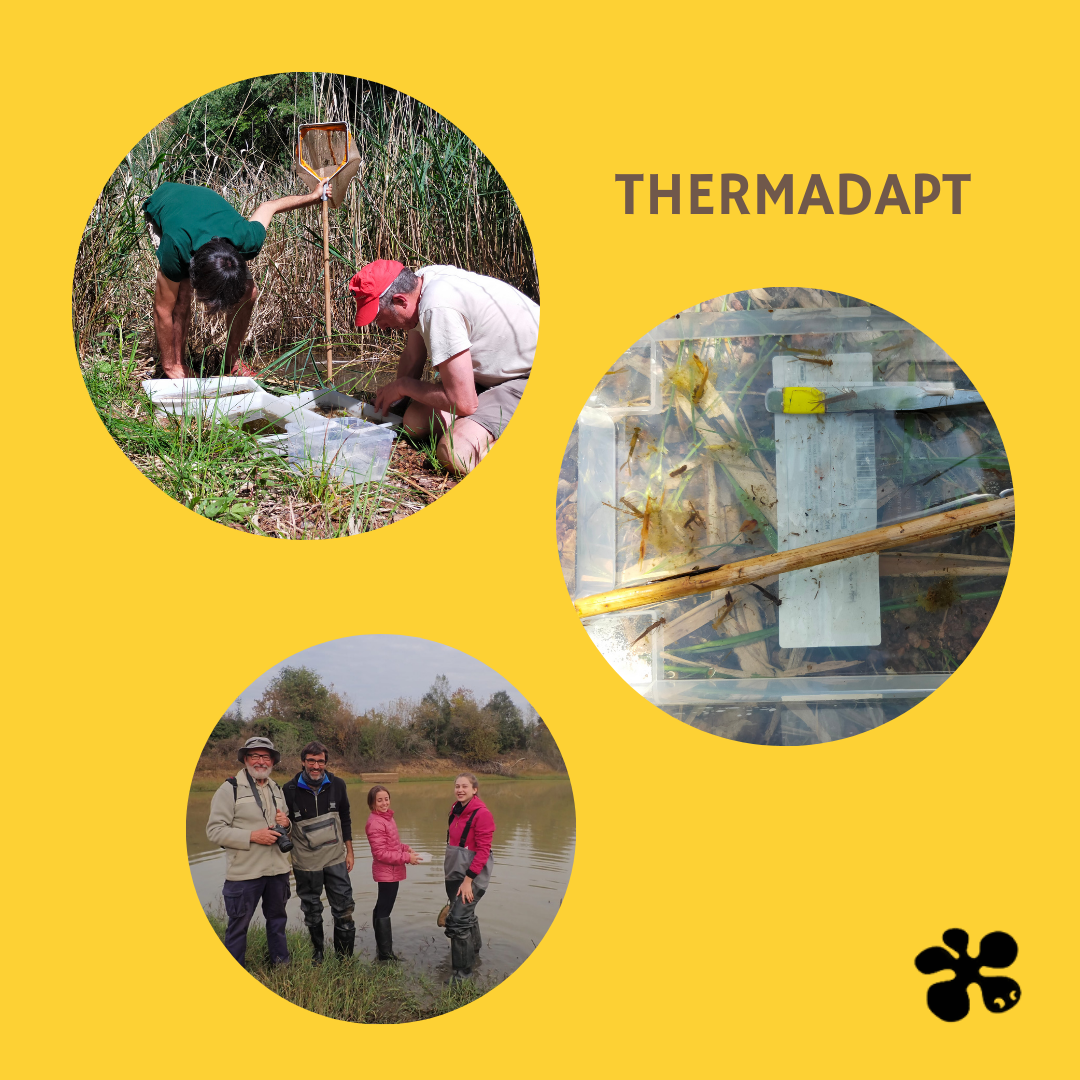Disentangling the adaptive capacity of vulnerable species to climate change across Mediterranean ecosystems (THERMADAPT)
Biodiversity plays a crucial role in ecosystem functions and stability. In this context, one of the major challenges of the scientific community is to understand how biodiversity will face the changing environmental conditions caused by ongoing climate change. Several predictive future climatic models suggest the Mediterranean region will be one of the most affected areas by climate warming and prolonged drought events, with important effects on both terrestrial and aquatic ecosystems. There is a need to evaluate the adaptive potential of Mediterranean species and shed light into the mechanisms underlying local thermal adaptation in different environments.
The project ThermAdapt aimed to assess the thermal adaptive responses to warming in the common blue damselfly Coenagrion puella (Odonata) and the purple sea urchin Paracentrotus lividus (Echinoidea). The project was led by Cesc Múrria from the Macro&Evo Lab in the Sistemàtica i Evolució Zoològica (ZooSysEvo) group and Cinta Pegueroles from the Evolutionary Genetics Group, IRBio, at Universitat de Barcelona. They also worked with Alba Julià and Carla Fernández, both are master students from the University of Barcelona. During the interdisciplinary project they collaborated with Dr. Marta Pascual and Dr. Carlos Carreras, geneticists specialized in the diversity of genetics of marine organisms from the Evolutionary Genetics Group, Institut de Recerca de la Biodiversitat-IRBio, Universitat de Barcelona. Lastly, they worked with Xavier Maynou and Ricard Martín, specialists in the biology, ecology, and taxonomy of Odonates and members of the Catalan Group for studying the Odonata within the Catalan Institute of Natural History (Oxygastra-ICHN). ThermAdapt was funded by the IRBio Research Promotion program 2021 (PR_IRBio-2021).
Species Show some Resilience to Temperature Shifts in Face of Climate Change
ThermAdapt conducted a high-throughput comparative transcriptome analysis on two species, C. puella and P. lividus, residing in freshwater and marine ecosystems, respectively. These species are anticipated to face significant impacts from rising temperatures due to climate change, hence the need for the project to assess the phenotypic plasticity capacity towards temperature shifts in the two species.
For C. puella, 24 individuals from warm (305 masl; Sanana stream, Sant Llorenç del Munt) and cold (1615 masl, Peguera, Berguedà) populations were submitted to heat shock experiments in laboratory-controlled temperatures after a short period of acclimatation. Individuals from the two populations were separated in batches and submitted to three temperatures: “Cold” (4°C), “Hot” (22°C) and control (13°C). After de novo transcriptome assembly, it was quantified gene expression and screened for differentially expressed genes among treatments. The results suggests more complex responses to regulate gene expression in cold than hot conditions. Most functionally annotated genes were associated with biological processes (regulation of cellular and metabolic processes, RNA polyadenylation, and response to stimulus). The response was similar for the warm and cold populations, likely due to common mechanisms across populations, and supports high phenotypic plasticity for C. puella.
For P. lividus, 24 individuals from two populations with different temperature regimes (Colera and El Perelló, being the cold and hot populations respectively) were subjected to acute thermal changes at cold, control and hot temperatures (7°C, 14°C and 20°C respectively) in a laboratory-controlled experiment. By comparing the gene expression patterns between treatments and populations, it was determined that P. lividus responds differently according to exposed thermal conditions. These differentially expressed genes are associated with a variety of functions, including defensive mechanisms and regulation of apoptotic processes. The low percentage of shared expressed genes between cold and hot treatments (1%), coupled with their functionality, suggests the responses to each thermal stress are independent mechanisms. Importantly, the responses recorded were similar for the cold and hot populations, suggesting parallel response mechanisms along the studied spatial scale.
This research sheds light on the biotic responses of these species to climate change in the Mediterranean region, emphasizing their resilience in facing temperature shifts brought about by climate change. Despite the freshwater and marine individuals studied were captured from hot and warm populations, all of them performed similarly to acute thermal stress, which indicates high plasticity to face climate warming. Hence, Thermadapt reveals the two species are potentially able to tolerate temperature warming, however global change may affect the freshwater species by habitat loss if the streams that it inhabits dry out during extreme hot events.
